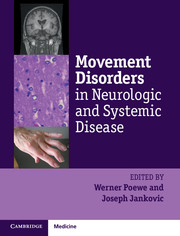Book contents
- Frontmatter
- Contents
- List of contributors
- List of videos
- List of abbreviations
- Preface
- Section I General principles
- Section II Movement disorders in systemic disease
- Section III Iatrogenic and toxic movement disorders
- Section IV Movement disorders in general neurology
- Section V Systemic complications of movement disorders
- Chapter 24 Dysautonomia in movement disorders
- Chapter 25 Gastrointestinal complications of movement disorders
- Chapter 26 Respiratory complications of movement disorders
- Chapter 27 Movement disorders emergencies
- Index
- Plate Section
- References
Chapter 26 - Respiratory complications of movement disorders
from Section V - Systemic complications of movement disorders
Published online by Cambridge University Press: 05 April 2014
- Frontmatter
- Contents
- List of contributors
- List of videos
- List of abbreviations
- Preface
- Section I General principles
- Section II Movement disorders in systemic disease
- Section III Iatrogenic and toxic movement disorders
- Section IV Movement disorders in general neurology
- Section V Systemic complications of movement disorders
- Chapter 24 Dysautonomia in movement disorders
- Chapter 25 Gastrointestinal complications of movement disorders
- Chapter 26 Respiratory complications of movement disorders
- Chapter 27 Movement disorders emergencies
- Index
- Plate Section
- References
Summary
Introduction
Movement disorders can be divided into hypokinetic disorders, manifested by paucity or slowness (bradykinesia) of movement, hyperkinetic disorders, dominated by excessive, abnormal involuntary movements, hypertonic disorders, such as spasticity and stiff person syndrome, and ataxia dominated by incoordination of movement (see Table 26.1). While in most patients the movement disorder is dominated by either parkinsonism, usually caused by Parkinson’s disease (PD), or some involuntary movement such as tremor, dystonia, chorea, tics, myoclonus, or stereotypy (Jankovic 2009a), non-motor, autonomic, or systemic features may accompany the primary motor disorder. In this chapter we will focus on respiratory problems encountered by patients with movement disorders and provide a guide to the clinical diagnosis, classification, and treatment.
Hypokinetic movement disorders
Hypokinetic movement disorders are divided into classical PD and atypical parkinsonism (also referred to as parkinsonism plus syndromes). Compared to PD patients, patientswith atypical parkinsonism usually lack the typical rest tremor, and tend to have a poor response to levodopa and a more rapid progression, as well as additional (“plus”) features, such as ophthalmoparesis in progressive supranuclear palsy (PSP) and dysautonomia in multiple system atrophy (MSA) (Fahn et al. 2011).
Information
- Type
- Chapter
- Information
- Movement Disorders in Neurologic and Systemic Disease , pp. 398 - 418Publisher: Cambridge University PressPrint publication year: 2014
